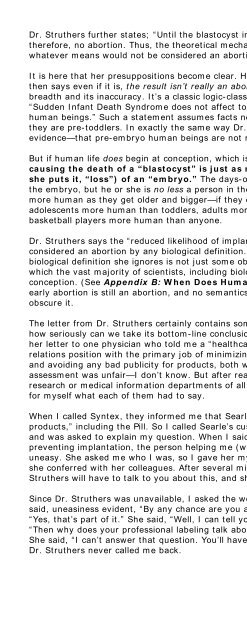Does the Birth Control Pill Cause Abortions
Does the Birth Control Pill Cause Abortions
Does the Birth Control Pill Cause Abortions
Create successful ePaper yourself
Turn your PDF publications into a flip-book with our unique Google optimized e-Paper software.
Dr. Stru<strong>the</strong>rs fur<strong>the</strong>r states; “Until <strong>the</strong> blastocyst implants…<strong>the</strong>re would be no loss of an embryo and,<br />
<strong>the</strong>refore, no abortion. Thus, <strong>the</strong> <strong>the</strong>oretical mechanism of reduced likelihood of implantation by<br />
whatever means would not be considered an abortion by any biological definition.”<br />
It is here that her presuppositions become clear. Having said implantation won’t be prevented, she<br />
<strong>the</strong>n says even if it is, <strong>the</strong> result isn’t really an abortion. This statement is profound both in its<br />
breadth and its inaccuracy. It’s a classic logic-class-illustration of faulty reasoning. It’s like saying<br />
“Sudden Infant Death Syndrome does not affect toddlers; <strong>the</strong>refore, it does not involve <strong>the</strong> deaths of<br />
human beings.” Such a statement assumes facts not in evidence: that infants are not people because<br />
<strong>the</strong>y are pre-toddlers. In exactly <strong>the</strong> same way Dr. Stru<strong>the</strong>rs assumes—without offering any<br />
evidence—that pre-embryo human beings are not really human beings.<br />
But if human life does begin at conception, which is <strong>the</strong> overwhelming biological consensus, <strong>the</strong>n<br />
causing <strong>the</strong> death of a “blastocyst” is just as much an abortion as causing <strong>the</strong> death (or as<br />
she puts it, “loss”) of an “embryo.” The days-old individual is a smaller and younger person than<br />
<strong>the</strong> embryo, but he or she is no less a person in <strong>the</strong> sight of God who created him. People do not get<br />
more human as <strong>the</strong>y get older and bigger—if <strong>the</strong>y did, toddlers would be more human than infants,<br />
adolescents more human than toddlers, adults more human than adolescents and professional<br />
basketball players more human than anyone.<br />
Dr. Stru<strong>the</strong>rs says <strong>the</strong> “reduced likelihood of implantation by whatever means would not be<br />
considered an abortion by any biological definition.” This statement is unscientific in <strong>the</strong> extreme. The<br />
biological definition she ignores is not just some obscure definition of life, but <strong>the</strong> precise definition,<br />
which <strong>the</strong> vast majority of scientists, including biologists, actually hold to—that life begins at<br />
conception. (See Appendix B: When <strong>Does</strong> Human Life Begin The Answer of Science.) An<br />
early abortion is still an abortion, and no semantics change this reality, even if <strong>the</strong>y manage to<br />
obscure it.<br />
The letter from Dr. Stru<strong>the</strong>rs certainly contains some valid information along with <strong>the</strong> invalid. But<br />
how seriously can we take its bottom-line conclusions that <strong>the</strong> <strong>Pill</strong> is not an abortifacient I showed<br />
her letter to one physician who told me a “healthcare information services director” is a public<br />
relations position with <strong>the</strong> primary job of minimizing controversy, denying blame, putting out fires,<br />
and avoiding any bad publicity for products, both with physicians and <strong>the</strong> general public. Perhaps this<br />
assessment was unfair—I don’t know. But after reading her letter I determined to personally call <strong>the</strong><br />
research or medical information departments of all <strong>the</strong> major birth control manufacturers and hear<br />
for myself what each of <strong>the</strong>m had to say.<br />
When I called Syntex, <strong>the</strong>y informed me that Searle had recently purchased all <strong>the</strong>ir “feminine<br />
products,” including <strong>the</strong> <strong>Pill</strong>. So I called Searle’s customer service line, identified myself by name,<br />
and was asked to explain my question. When I said that it related to <strong>the</strong> <strong>Pill</strong>’s mechanism of<br />
preventing implantation, <strong>the</strong> person helping me (who didn’t identify herself) became discernibly<br />
uneasy. She asked me who I was, so I gave her my name again. Then she asked me to wait while<br />
she conferred with her colleagues. After several minutes she got back on <strong>the</strong> line and said “Dr.<br />
Stru<strong>the</strong>rs will have to talk to you about this, and she’s not in.”<br />
Since Dr. Stru<strong>the</strong>rs was unavailable, I asked <strong>the</strong> woman if she could offer me any guidance. She<br />
said, uneasiness evident, “By any chance are you asking about this for religious reasons” I said,<br />
“Yes, that’s part of it.” She said, “Well, I can tell you that our pills are not abortifacients.” I asked,<br />
“Then why does your professional labeling talk about <strong>the</strong> <strong>Pill</strong> reducing <strong>the</strong> likelihood of implantation”<br />
She said, “I can’t answer that question. You’ll have to talk to Dr. Stru<strong>the</strong>rs.” I left my number, but<br />
Dr. Stru<strong>the</strong>rs never called me back.



